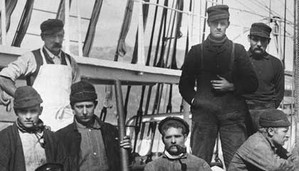About this site
This is a Maine Maritime Museum project initially funded by a Hidden Collections grant from the Council on Library and Information Resources (CLIR). The database contains information about mariners which comes from original documents in the manuscript collections of the Museum.
Our research library has been asked for decades for information about merchant seamen, fishermen, and others who went to sea "before the mast". Scholars, students, and family researchers alike agree that such information is scarce and hard to find. With the help of our friends at CLIR and the Gladys Krieble Delmas Foundations, we have started to do something about that.
This is a database of information on mariners (sailors) contained in the original documents here at Maine Maritime Museum. It is not a list of all sailors, nor is it likely ever to be. It was begun in 2013 with the 45 manuscript collections originally funded by CLIR. Museum volunteers and staff will continue to add names and voyages here for the foreseeable future, working from other manuscript collections. We are always adding new collections to our library, so the work on this database will always continue. If you are looking for a particular mariner and do not find him here, you might want to check again at a later time.
The manuscript collections at Maine Maritime Museum all have something to do with a Maine ship, shipyard, mariner, fleet, or maritime business. However, Maine ships and mariners traveled all over the world, so the sailors in this database come from all over.
Most of the people in the database were sailors aboard merchant vessels. Some were employed aboard fishing vessels, but we have far fewer manuscripts relating to fishing voyages. A few Maine captains obtained acting naval commissions during the Civil War, and kept their naval documents, so there are even a few naval seamen in the database, but this is not really a place to search for the records of naval personnel.
In entering financial information, we have converted all foreign currencies into U.S. dollars, using the exchange rate the captain used at the time. Usually, this involved British pounds sterling. Generally, the exchange rate was noted on the original document. If not, we have assumed the rate to be $5 = £1, for 19th century voyages.
About Merchant Mariners
The mariners in the database are from all over the world. The crew of a fishing vessel or a small coasting schooner might be largely from the town that was the vessel’s home port, but deepwater vessels trading across oceans and the later large, multi-masted schooners tended to acquire a new crew at each port they left from. These larger vessels rarely returned to the small Maine ports where they were built, registered, and owned.
One fact that can complicate a search for a particular mariner was the tendency for many deepwater seamen in the later 19th century to give false names when they signed on a ship. Some may have been avoiding prosecution for a real or imagined crime ashore, but most who did this were hoping to avoid having potential difficulties with as-yet unknown officers attached to their real names.
The information in this database about each mariner is directly from the document that carries the mariner’s name. The spelling of the name may or may not be correct; that and other information is just as the captain or shipping agent gave it. We have noticed that the arithmetic involved in computing the mariners’ pay is often wrong (we have not corrected it), and we assume that other things may be wrong, too.
Many documents do not give birthplace, but these mariners are clearly from all over the world. In the early years of the United States, seafaring was seen as adventurous and something that every young man should at least try. Through the course of the 19th century, the nation’s interests focused more on the railroads and the development of the West. By the late 1800s, the crews of American vessels were predominantly foreigners, recent immigrants, and African-Americans.
How to Search
In the name box, you can search by last name only (recommended), or by the whole name in normal order (search by John Doe rather than Doe, John). You can also search by first name, if you care to. This box also searches the mariner notes field, but there is not much data in that part of the database. You may also search by birthplace/residence (leaving the name box blank) – this search box searches both birthplace and residence fields. The drop-down menu allows you the choice of the birthplaces and places of residence which have been recorded so far in the database. The last search box makes it possible to search for mariners of a specific nationality. Again, a drop-down menu shows you the nationalities which have so far been entered into the database. Selecting one will get you a list of the recorded mariners of that nationality.
Search results will show you names of mariners which you can click on to get to information about that mariner and his or her voyages and vessels, and the documents which record that information. Clicking on each of these will lead you to additional information. In particular, clicking on the document description will get you whatever financial details are recorded, relating to that specific mariner.
